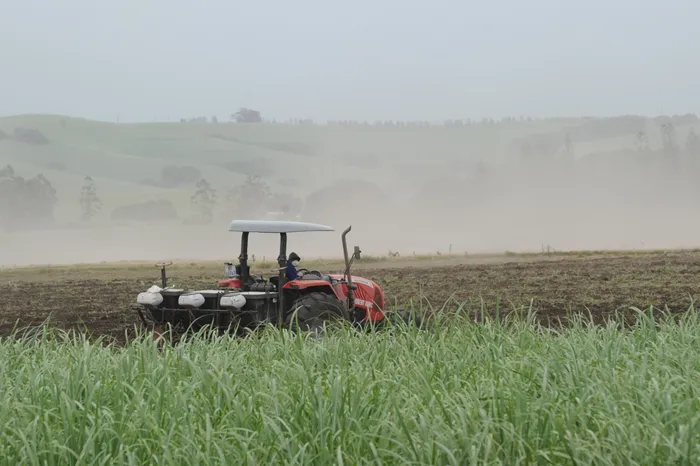Rethinking the sugar tax in the time of global uncertainty: focus should be on jobs and the economy

Strong wind creates a dust cloud behind a workman on a tractor in sugar cane fields in the Umhlali area, North Coast, KwaZulu Natal.
Image: Karen Sandison/ Independent Newspapers
As South Africa awaits Finance Minister Enoch Godongwana’s third budget framework this year, local industries are also coming to terms with the uncertainty that 2025 has brought to the international trade environment. Even though the US has suspended the proposed 30% tariff on South African goods for 90 days – instead levying 10% for the time being – the change to existing trade agreements and uncertainty is still harmful to local industries like South Africa’s sugarcane growers.
This is a new threat to a local industry already beset by many challenges. The recent extreme, unseasonable rainfall in KwaZulu-Natal has caused isolated flooding and delayed the start of the harvesting season in some sugarcane producing areas. Cheaper sugar imports, often from countries with subsidised sugar industries, are threatening once again to eat into our proudly local produce. And the spectre of the Health Promotion Levy (or sugar tax) still hangs over the industry.
SA Canegrowers welcomed Minister Godongwana’s decision in the two previous budget drafts to not increase the sugar tax beyond its current level.
But the reality is that there is no reason for this tax to be retained at all. Since it was introduced in 2018, it has not achieved any of its stated health goals and has been destructive in many other ways. It has suppressed economic activity and cost jobs and has not generated significant revenue for the Treasury.
The South African Revenue Service (SARS) still lists the sugar tax as a policy tool aimed to decrease obesity and other non-communicable diseases. The tax aims to reduce consumption of drinks containing sugar, which in theory should have an impact on the health of South Africans. But after seven years of the tax, no evidence has been provided that it reduces disease or obesity. Yet what we do know is that it is very harmful to the rural agricultural communities that rely on sugarcane growers for jobs and stability.
A Nedlac study conducted at the time of its introduction found that the sugar tax wiped out R2 billion in revenue from the industry in 2018/19 alone. At its core, the sugar tax is a policy failure because it costs livelihoods. Rural communities, particularly in KwaZulu-Natal and Mpumalanga, are bearing the brunt of this economic squeeze. Thousands of jobs have already been lost in the industry, and further tax hikes would only worsen the situation.
Since the introduction of the sugar tax, the sector has been operating under this sustained economic strain, exacerbated by global and domestic challenges.
Now we are contending with an uncertain global trading environment, and potentially punitive tariffs from a significant market for South Africa’s sugar exports.
This volatility is directly felt by South Africa’s growers. Small-scale growers, who are the economic anchors of their communities, are especially at risk of exiting the industry should the sugar tax burden continue, according to a modelling study done by the Bureau for Food and Agricultural Policy (BFAP). It is important to note that such modelling was also done before the current potential upheaval in SA-US trade, and losing a key market for SA sugar would even further exacerbate this problem.
Having small-scale growers exit the industry would be tragic, since the sugar industry has put in place many initiatives to give these growers equitable and equal access to economic opportunities over many decades. These initiatives align with the government policy for a more transformed and inclusive agricultural industry.
There is an immediate opportunity for our government though: scrapping the sugar tax completely to give the sugar industry the runway to deal with the many other external threats.
SA Canegrowers has consistently advocated for a comprehensive dietary intake study to better understand the multifaceted causes of obesity and non-communicable diseases in South Africa. Such a study was initially proposed under the Sugar Industry Value Chain Master Plan’s first phase, started in 2020 - but it has not yet been undertaken. A commitment from the government to this research can still facilitate evidence-based policymaking.
The Master Plan also lays out ways the sugar industry could support a growing and expanding economy. Diversification holds the potential to create jobs, bring new direct investment into South Africa, and create a more resilient economy that can weather global shocks. There are opportunities to expand into biofuels, sustainable aviation fuels (SAFs), and other sugarcane-based products. But we need government commitment to make these a reality through cohesive policies and a stable environment to attract investment.
This will, in the long run, create a stronger, more resilient economy, with a larger tax base. This can provide the Treasury with more funds to allocate to healthcare and other critical public services. Instead of stifling growth with short-sighted taxation, policymakers should prioritise long-term economic strategies that will ultimately benefit both public health and the national economy.
If the government truly seeks to improve public health, it must take a more comprehensive approach—one based on scientific and economic evidence. The sugar tax is not the solution; it is a big part of the problem.